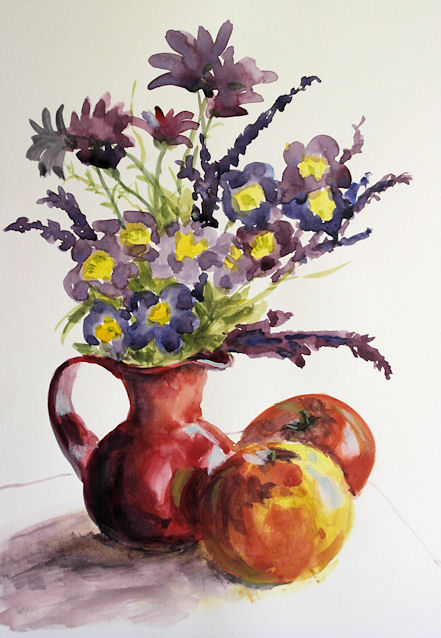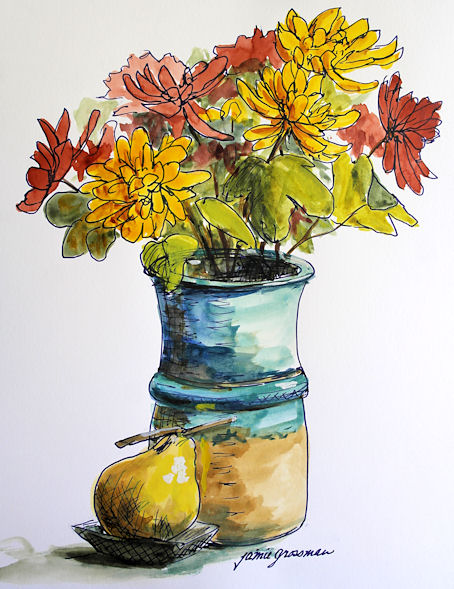It is now many months later, and the results are in! I tested 41 eternal, pigmented, and iron gall inks. There are another 45 or so inks that I tested at the same time, which do not fall into those categories, and I will discuss those briefly here as well. Before I go into the results, it is important to note that terminology varies between fountain pen folks and artists. No fountain pen ink is expected to live up to archival standards in art materials terms. These inks are not designed to be lightfast when exposed to UV light. Brian and I both faced this test with low expectations, which were, for the most part, confirmed. That being said, there were some inks that held up better than expected, and others that did surprisingly terrible in their class. Also, ink manufacturers sometimes make changes in color or composition of their inks between batches, so the results you get may be different from mine. For example, Noodler's Lexington Gray performed much better this time than a sample of it that I'd tested a couple of years ago.
SUMMARY
After five months, there were no inks that looked exactly the same as their control samples. However, some did extremely well, and changed very little. Those changes might not even be visible in the photos. The inks that were in this top tier are:
- Noodler's Black
- Noodler's Blackerase Waterase (big surprise for me!)
- Noodler's Kung Te-Cheng
- Noodlers La Reine Mauve
- Platinum Carbon Black
- Platinum Pigmented Blue
- Sailor Nano Black
- Sailor Blue Black
The second tier lists the inks that had a color shift greater than the inks above, but they didn't shift or fade very much. Those inks are:
- Noodlers Heart of Darkness
- Noodlers Polar Black
- Noodlers X-feather
- Noodlers Lexington Gray
- Noodlers Bad Blue Heron
- Noodlers Luxury Blue
- Noodlers Polar Blue
I gave a preliminary report last February about how the inks changed after the first six weeks. The samples then went back into the window for another three and a half months. Some changed little in the first six weeks and then nearly vanished! Others changed quite a bit in the first six, and not too much more after that. I attribute that to different ingredients and dyes in the inks, some of which are responding to the UV light faster or slower than others. Because of this interesting difference in the time frames, I am going to post both the six week and five month samples one below the other. Only the Noodlers Eternal Inks have six-week results, since I put those tests into the window first. The others have only the five-month images. (They went into the window later and came out later.)
Artists who are interested in knowing which inks can create a wash, and the color of the wash, will be able to see that in the samples. That washed area is generally where changes first appear, since there is a thinner application of the ink there. The six week and five month photos were taken with different cameras and different light sources, but you can still do the comparisons on each page. You can click images for a larger, clearer view. One thing you will notice is that due to the optical brighteners in the paper, the UV light caused the paper to yellow a bit by the five month mark, even though it is archival paper.
The control side is on the left, which was kept inside a sketchbook. The right side of each page was in the window. I then taped the pages back together to photograph them. It's much easier to make the comparisons with the sides together this way.
If you have a favorite ink in this test group, be sure you look at both the six week and five month samples! Remember that some inks that showed little change in six weeks had huge changes just a few weeks later. All images are clickable for a larger, clearer view.
Sheet 1, Six week sample:
Sheet 1, after five months:
Sheet 2, six week sample:
Sheet 2, five month sample:
Sheet 3, six week sample:
Sheet 3, five month sample:
Sheet 4, six week sample:
Sheet 4, five month sample:
Sheet 5, six week samples:
Sheet 5, five month samples:
Sheet 6, six week samples:
Sheet 6, five month samples:
Sheet 7, six week samples:
Sheet 7, five month samples:
Below are tests of the following inks that were included in the study, but not photographed at the six week mark. These were also in the window for five months:
- Platinum Carbon Black
- Platinum Pigmented Rose Red
- Platinum Pigmented Sepia
- Platinum Pigmented Blue
- Sailor Sei-Boku Blue Black
- Sailor Kiwa-Gura Nano Black
- Rohrer & Klingner Scabiosa
- Rohrer & Klingner Salix
- Diamine Registrar's Blue-Black
Sheet 8, five month samples:
Sheet 9, five month samples:
That was it for the Eternal, iron gall, and pigmented ink samples I had for testing. If you found some of those results discouraging, you'll feel better about them once you look at inks that don't fall into those categories. I didn't even photograph most of those, because for the most part, they nearly vanished. Below are two examples.
Sheet 10 after five months:
Sheet 11 after 5 months:
Thank you all for your patience in waiting for these results. It took a long time to get these all done and photographed, adjusted, and posted. I hope it was worth the wait for you, and that you find this information useful. It's been interesting for me to see how some of my personal favorites have fared, and as an artist, I now know more about which inks I'd use for what applications.
I previously tested many other fountain pen inks and put the results up on my blog with images. You can see those on these links:
Lightfastness Results
More Ink Lightfastness Test Results
Lightfastness Results of 15 More Ink Samples
Eleven More Lightfastness Tests Revealed

















































